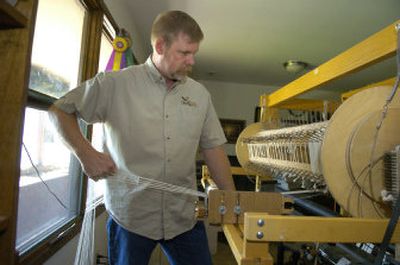Creating ‘something from nothing’

Michael and JoDee Hickey have taken what most would consider a setback and spun it into a success story.
When Michael Hickey was laid off from his position as an engineer with Sprint, the loss of his job became the catalyst to launch his dream – a family-owned textile mill. Now, four years later, Quail Run Fiber Mill is a thriving cottage industry in Airway Heights.
The germination of that great idea stemmed from a problem Hickey encountered in his 20s, while raising angora goats. “I found I had a lot of mohair fiber, but no way to get it into a form to knit or spin,” he said. “I saw the gap between the fiber and the processing.”
His engineering background came in handy as he researched fiber mills and developed a business plan. He sought out experts to help him transform his idea into a workable venture. Hickey recently walked guests through the converted hay barn that houses the mill operation.
Quail Run processes all kinds of fiber, from sheep’s wool to llama and even dog hair. However, Hickey said 75 percent of their business is wool and alpaca.
The fiber comes to them in its natural state. This means dirty, greasy and usually smelling like a barnyard.
“We go through the fiber and tag and bag it, and then we run it through a series of hand washes and rinses to remove the oils and the grease,” Hickey said. Next, the fiber is laid to dry on custom drying racks that look familiar. “They’re actually converted bread racks,” he said with a grin. They found that stacking, aerated trays were perfect for drying fleece.
“After it dries for a day or two we run it through a picker,” he continued. The picker they use was built in 1941. “All of our equipment came from bigger mills that were closing,” he said. The fiber is blown through the machine, which separates the clumps of fleece into strands.
Next, the fleece is run through a 1911-era carding machine. The huge device looks like it belongs in a textile museum, but the finely tuned instrument ably organizes the fiber, and combs it into one long piece.
From the carding machine the fiber is fed through a pin drafter, which combs it until the fluffy fleece at last resembles yarn. Hickey took a strand from the machine and said, “A hand spinner could spin straight from this roving,” he said. A roving is a slightly twisted roll or strand of fibers.
The roving is then threaded through a spinning frame, which spins it into yarn. Twenty-eight wooden bobbins stretch across the top of the frame, each one swirled with strands of alpaca fiber. The mill customizes the fiber to the specifications of the client. Some may want roving, others yarn and others want a more finished product, like blankets.
Hickey said, “Originally the roving and yarn was going to be the finished product, but I had a customer say, ‘I wish someone would make blankets.’ ” Now, he estimates blankets are 40 percent of their business. “We probably make 30 a month,” he said.
The blankets are woven on a loom in their home office. Each thread is wound by hand. JoDee Hickey said, “It takes about a day to set the loom up.” She hand-ties each knot on the edges of their blankets.
From their sunlit office, dominated by the large loom, the couple reflected on the amazing journey they’ve taken in the past four years. With no advertising, word about their mill spread from customer to customer all across the country. “We just finished an order for someone in West Virginia,” Michael Hickey said, shaking his head.
The couple finds great fulfillment in their work. “The fiber comes in stinky and greasy, and we transform it into something that could be an heirloom,” Hickey said. “There’s a lot of satisfaction in creating something from nothing.”
The rapid growth of Quail Run has been both unexpected and gratifying, but for the Hickeys, bigger is not necessarily better. They don’t want to have to hire employees. “We put our hands on everything we do,” Hickey said. “When you hire people, you lose a certain amount of quality control.”
And they have a more personal reason for keeping the business small. Michael Hickey looked at his wife and said, “We’re best friends. We get to spend all day together and be here with our kids.” The couple have three children. Their oldest is in the Air Force, but they still have two teens at home. “I feel like I get to watch my kids grow up,” he said. “You can’t get these days back.”